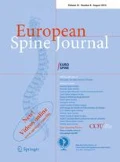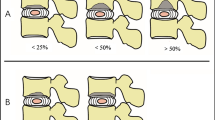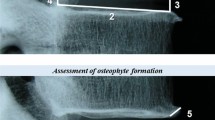Abstract
The aim of this literature review was to present and to evaluate all grading systems for cervical and lumbar disc and facet joint degeneration, which are accessible from the MEDLINE database. A MEDLINE search was conducted to select all articles presenting own grading systems for cervical or lumbar disc or facet joint degeneration. To give an overview, these grading systems were listed systematically depending on the spinal region they refer to and the methodology used for grading. All systems were checked for reliability tests and those recommended for use having an interobserver Kappa or Intraclass Correlation Coefficient >0.60 if disc degeneration was graded and >0.40 if facet joint degeneration was graded. MEDLINE search revealed 42 different grading systems. Thirty of these were used to grade lumbar spine degeneration, ten were used to grade cervical spine degeneration and two were used to grade both. Thus, the grading systems for the lumbar spine represented the vast majority of all 42 grading systems. Interobserver reliability tests were found for 12 grading systems. Based on their Kappa or Intraclass Correlation Coefficients nine of these could be recommended for use and three could not. All other systems could neither be recommended nor not be recommended since reliability tests were missing. These systems should therefore first be tested before use. The design of the grading systems varied considerably. Five grading systems were beginning with the lowest degree of degeneration, 37, however, with the normal, not degenerated state. A 5-grade scale was used in six systems, a 4-grade scale in 24, a 3-grade scale in eight and a 2-grade scale in three systems. In 15 cases the normal, not degenerated state was assigned to “grade 0”, in another 15 cases, however, this state was assigned to “grade 1”. This wide variety in the design of the grading systems makes comparisons difficult and may easily lead to confusion. We would therefore recommend to define certain standards. Our suggestion would be to use a scale of three to five grades, to begin the scale with the not degenerated state and to assign this state to “grade 0”.
Similar content being viewed by others
References
Adams MA, Dolan P, Hutton WC (1986) The stages of disc degeneration as revealed by discograms. J Bone Joint Surg Br 68(1):36–41
Adams MA, McNally DS, Dolan P (1996) ’Stress’ distributions inside intervertebral discs. The effects of age and degeneration. J Bone Joint Surg Br 78(6):965–972
Berlemann U, Gries NC, Moore RJ (1998) The relationship between height, shape and histological changes in early degeneration of the lower lumbar discs. Eur Spine J 7(3):212–217
Boos N, Nerlich AG, Wiest I, von der Mark K, Aebi M (1997) Immunolocalization of type X collagen in human lumbar intervertebral discs during ageing and degeneration. Histochem Cell Biol 108(6):471–480
Boos N, Wallin A, Schmucker T, Aebi M, Boesch C (1994) Quantitative MR imaging of lumbar intervertebral disc and vertebral bodies: methodology, reproducibility, and preliminary results. Magn Reson Imaging 12(4):577–587
Boos N, Weissbach S, Rohrbach H, Weiler C, Spratt KF, Nerlich AG (2002) Classification of age-related changes in lumbar intervertebral discs: 2002 Volvo Award in basic science. Spine 27(23):2631–2644
Brant-Zawadzki MN, Jensen MC, Obuchowski N, Ross JS, Modic MT (1995) Interobserver and intraobserver variability in interpretation of lumbar disc abnormalities. A comparison of two nomenclatures (discussion 1264). Spine 20(11):1257–1263
Brooker AE, Barter RW (1965) Cervical spondylosis. A clinical study with comparative radiology. Brain 88(5):925–936
Buckwalter JA (1995) Aging and degeneration of the human intervertebral disc. Spine 20(11):1307–1314
Butler D, Trafimow JH, Andersson GB, McNeill TW, Huckman MS (1990) Discs degenerate before facets. Spine 15(2):111–113
Carrera GF, Haughton VM, Syvertsen A, Williams AL (1980) Computed tomography of the lumbar facet joints. Radiology 134(1):145–148
Cohen J (1968) Weighted kappa: nominal scale agreement with provision for scaled disagreement or partial credit. Psychol Bull 70:213–220
Collins DH (1949) The pathology of articular and spinal diseases. Edward Arnold & Co, London
Coste J, Judet O, Barre O, Siaud JR, Cohen de Lara A, Paolaggi JB (1994) Inter- and intraobserver variability in the interpretation of computed tomography of the lumbar spine. J Clin Epidemiol 47(4):375–381
Cote P, Cassidy JD, Yong-Hing K, Sibley J, Loewy J (1997) Apophysial joint degeneration, disc degeneration, and sagittal curve of the cervical spine. Can they be measured reliably on radiographs? Spine 22(8):859–864
Coventry MB (1945) The intervertebral disc: Its macroscopic anatomy and pathology: Part III. Pathological changes in the intervertebral disc lesion. J Bone Joint Surg [Am] 27:460–473
Coventry MB (1945) The intervertebral disc: Its microscopic anatomy and pathology: Part I. Anatomy, development and pathology. J Bone Joint Surg [Am] 27:105–112
Coventry MB (1945) The intervertebral disc: Its microscopic anatomy and pathology: Part II. Changes in the intervertebral disc concomitant with age. J Bone Joint Surg [Am] 27:233–247
Demaerel P, Wilms G, Goffin J, Baert AL (1992) Osteoarthritis of the facet joints and its role in low-back pain: evaluation with conventional tomography. J Belge Radiol 75(2):81–86
Eisenstein SM, Parry CR (1987) The lumbar facet arthrosis syndrome. Clinical presentation and articular surface changes. J Bone Joint Surg Br 69(1):3–7
Fleiss JL (1981) Statistical methods for rates and proportions, 2nd edn. Wiley, New York
Fletcher G, Haughton VM, Ho KC, Yu SW (1990) Age-related changes in the cervical facet joints: studies with cryomicrotomy, MR, and CT. AJR Am J Roentgenol 154(4):817–820
Fraser RD, Osti OL, Vernon-Roberts B (1993) Intervertebral disc degeneration. Eur Spine J 1:205–213
Friberg S, Hirsch C (1949) Anatomical and clinical studies on lumbar disc degeneration. Acta Orthop Scand 19:222–242
Friedenberg ZB, Miller WT (1963) Degenerative disc disease of the cervical spine. J Bone Joint Surg Am 45:1171–8
Galante JO (1967) Tensile properties of the human lumbar annulus fibrosus. Acta Orthop Scand (Suppl100):1–91
Gibson MJ, Buckley J, Mawhinney R, Mulholland RC, Worthington BS (1986) Magnetic resonance imaging and discography in the diagnosis of disc degeneration. A comparative study of 50 discs. J Bone Joint Surg Br 68(3):369–373
Gordon SJ, Yang KH, Mayer PJ, Mace AH Jr, Kish VL, Radin EL (1991) Mechanism of disc rupture. A preliminary report. Spine 16(4):450–456
Gries NC, Berlemann U, Moore RJ, Vernon-Roberts B (2000) Early histologic changes in lower lumbar discs and facet joints and their correlation. Eur Spine J 9(1):23–29
Grogan J, Nowicki BH, Schmidt TA, Haughton VM (1997) Lumbar facet joint tropism does not accelerate degeneration of the facet joints. AJNR Am J Neuroradiol 18(7):1325–1329
Gunzburg R, Parkinson R, Moore R et al (1992) A cadaveric study comparing discography, magnetic resonance imaging, histology, and mechanical behavior of the human lumbar disc. Spine 17(4):417–426
Hendry NG (1958) The hydration of the nucleus pulposus and its relation to intervertebral disc derangement. J Bone Joint Surg Br 40B(1):132–144
Hirsch C (1972) Some morphological changes in the cervical spine during ageing. In: Hirsch C, Zotterman Y (eds) Cervical pain. Pergamon Press, New York, pp 21–32
Kellgren JH, Jeffrey MR, Ball J (1963) The epidemiology of chronic rheumatism. vol II: Atlas of standard radiographs of arthritis. Blackwell Scientific Publications, Oxford, pp 14–19
Kellgren JH, Lawrence JS (1952) Rheumatism in miners. II. X-ray study. Br J Ind Med 9(3):197–207
Kellgren JH, Lawrence JS (1957) Radiological assessment of osteo-arthrosis. Ann Rheum Dis 16(4):494–502
Landis JR, Koch GG (1977) The measurement of observer agreement for categorical data. Biometrics 33(1):159–174
Lane NE, Nevitt MC, Genant HK, Hochberg MC (1993) Reliability of new indices of radiographic osteoarthritis of the hand and hip and lumbar disc degeneration. J Rheumatol 20(11):1911–1918
Lehto IJ, Tertti MO, Komu ME, Paajanen HE, Tuominen J, Kormano MJ (1994) Age-related MRI changes at 0.1 T in cervical discs in asymptomatic subjects. Neuroradiology 36(1):49–53
Lindblom K (1944) Protrusions of discs and nerve compression in the lumbar region. Acta Radiol 25:195
Lindblom K (1951) Backache and its relation to ruptures of the intravertebral disks. Radiology 57(5):710–719
Lindblom K (1951) Discography of dissecting transosseous ruptures of intervertebral discs in the lumbar region. Acta Radiol 36(1):12–16
Macnab I (1975) Cervical spondylosis. Clin Orthop (109):69–77
Madan SS, Rai A, Harley JM (2003) Interobserver error in interpretation of the radiographs for degeneration of the lumbar spine. Iowa Orthop J 23:51–56
Masaryk TJ, Ross JS, Modic MT, Boumphrey F, Bohlman H, Wilber G (1988) High-resolution MR imaging of sequestered lumbar intervertebral disks. AJR Am J Roentgenol 150(5):1155–1162
Milgram J (1990) Intervertebral disc disease and degenerative arthritis of the spine. In: Milgram J (ed) Radiologic and histologic pathology of nontumorous dieseases of bone and joints. Northbrook Publishing Company, pp 519–588
Mimura M, Panjabi MM, Oxland TR, Crisco JJ, Yamamoto I, Vasavada A (1994) Disc degeneration affects the multidirectional flexibility of the lumbar spine. Spine 19(12):1371–1380
Nachemson A (1960) Lumbar Intradiscal Pressure. Experimental studies on post-mortem material. Acta Orthop Scand Suppl 43:43
Naylor A, Smare DL (1953) Fluid content of the nucleus pulposus as a factor in the disk syndrome; preliminary report. Br Med J 4843:975–976
Nerlich AG, Schleicher ED, Boos N (1997) 1997 Volvo Award winner in basic science studies. Immunohistologic markers for age-related changes of human lumbar intervertebral discs. Spine 22(24):2781–2795
Osti OL, Vernon-Roberts B, Fraser RD (1990) 1990 Volvo Award in experimental studies. Anulus tears and intervertebral disc degeneration. An experimental study using an animal model. Spine 15(8):762–767
Pathria M, Sartoris DJ, Resnick D (1987) Osteoarthritis of the facet joints: accuracy of oblique radiographic assessment. Radiology 164(1):227–230
Pfirrmann CW, Metzdorf A, Zanetti M, Hodler J, Boos N (2001) Magnetic resonance classification of lumbar intervertebral disc degeneration. Spine 26(17):1873–1878
Resnick D (1985) Degenerative diseases of the vertebral column. Radiology 156(1):3–14
Schellhas KP, Smith MD, Gundry CR, Pollei SR (1996) Cervical discogenic pain. Prospective correlation of magnetic resonance imaging and discography in asymptomatic subjects and pain sufferers (discussion 311–312). Spine 21(3):300–311
Schneiderman G, Flannigan B, Kingston S, Thomas J, Dillin WH, Watkins RG (1987) Magnetic resonance imaging in the diagnosis of disc degeneration: correlation with discography. Spine 12(3):276–281
Shrout PE, Fleiss J (1979) Intraclass correlations: Uses in Assessing Rater Reliability. Psychol Bull 86(2):420–428
Silberstein CE (1965) The Evolution of Degenerative Changes in the Cervical Spine and an Investigation into the “Joints of Luschka”. Clin Orthop 40:184–204
Streiner DL, Norman GL (1989) Health measurement scales: a practical guide to their development and use. Oxford University Press, Oxford
Swanepoel MW, Adams LM, Smeathers JE (1995) Human lumbar apophyseal joint damage and intervertebral disc degeneration. Ann Rheum Dis 54(3):182–188
Tanno I, Oguma H, Murakami G, Sato S, Yamashita T (2003) Which portion in a facet is specifically affected by articular cartilage degeneration with aging in the human lumbar zygapophysial joint? Okajimas Folia Anat Jpn 80(1):29–34
Tertti M, Paajanen H, Laato M, Aho H, Komu M, Kormano M (1991) Disc degeneration in magnetic resonance imaging. A comparative biochemical, histologic, and radiologic study in cadaver spines. Spine 16(6):629–634
Thompson JP, Pearce RH, Schechter MT, Adams ME, Tsang IK, Bishop PB (1990) Preliminary evaluation of a scheme for grading the gross morphology of the human intervertebral disc. Spine 15(5):411–415
Töndury G (1972) The behaviour of the cervical discs during life. In: Hirsch C, Zotterman Y (eds) Cervical pain. Pergamon Press, New York, pp 59–66
Vernon-Roberts B (1987) Pathology of intervertebral discs and apophyseal joints. The lumbar spine and back pain. Churchill-Livingstone, London, pp 37–55
Vernon-Roberts B, Pirie CJ (1977) Degenerative changes in the intervertebral discs of the lumbar spine and their sequelae. Rheumatol Rehabil 16(1):13–21
Viikari-Juntura E, Raininko R, Videman T, Porkka L (1989) Evaluation of cervical disc degeneration with ultralow field MRI and discography. An experimental study on cadavers. Spine 14(6):616–619
Virgin WJ (1951) Experimental investigations into the physical properties of the intervertebral disc. J Bone Joint Surg Br 33B(4):607–611
Virgin WJ (1958) Anatomical and pathological aspects of the intervertebral disc. Indian J Surg 20:113
Weishaupt D, Zanetti M, Boos N, Hodler J (1999) MR imaging and CT in osteoarthritis of the lumbar facet joints. Skeletal Radiol 28(4):215–219
Wybier M (2001) Imaging of lumbar degenerative changes involving structures other than disk space. Radiol Clin North Am 39(1):101–114
Yasuma T, Koh S, Okamura T, Yamauchi Y (1990) Histological changes in aging lumbar intervertebral discs. Their role in protrusions and prolapses. J Bone Joint Surg Am 72(2):220–229
Yu S, Haughton VM, Sether LA, Ho KC, Wagner M (1989) Criteria for classifying normal and degenerated lumbar intervertebral disks. Radiology 170(2):523–536
Ziv I, Maroudas C, Robin G, Maroudas A (1993) Human facet cartilage: swelling and some physicochemical characteristics as a function of age. Part 2: age changes in some biophysical parameters of human facet joint cartilage. Spine 18(1):136–146
Acknowledgements
The authors would specially like to thank the Deutsche Arthrose-Hilfe e.V. and the German Research Council (DFG, WI 1352/6-1) for financial support.
Author information
Authors and Affiliations
Corresponding author
Additional information
An erratum to this article can be found at http://dx.doi.org/10.1007/s00586-006-1077-9
Appendix
Appendix
Grading systems for lumbar disc degeneration
Macroscopic anatomy
Histology
Plain radiography
Magnetic resonance imaging
Discography
Grading systems for cervical disc degeneration
Plain radiography
Grading systems for lumbar facet joint degeneration
Computed tomography
Magnetic resonance imaging
Grading systems for cervical facet joint degeneration
Plain radiography
Rights and permissions
About this article
Cite this article
Kettler, A., Wilke, HJ. Review of existing grading systems for cervical or lumbar disc and facet joint degeneration. Eur Spine J 15, 705–718 (2006). https://doi.org/10.1007/s00586-005-0954-y
Received:
Revised:
Accepted:
Published:
Issue Date:
DOI: https://doi.org/10.1007/s00586-005-0954-y




